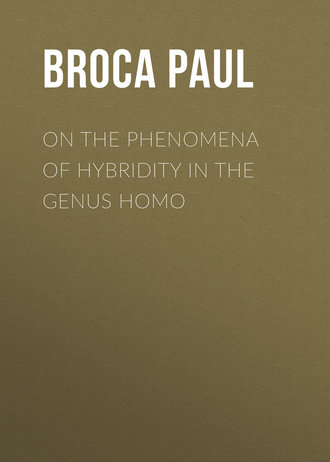 полная версия
полная версияOn the Phenomena of Hybridity in the Genus Homo
85
P. Sagot, Opinion générale sur l’Origine de la Nature des Races Humaines; Conciliation des Diversités indélibles avec l’Unité Historique du Genre Humain, Paris, 1860.
86
[Germs of the polygenist doctrine are, however, as old as Empedocles. See Julius Schvarcz, Geological Theories of the Greeks, 4to, London, 1862, for the most philosophical account of these early attempts. – Editor.]
87
We may be permitted to reproduce here some passage from a dissertation of this pious slave owner; we extract them from the Charleston Medical Journal and Review, Sept. 1854, vol. ix. pp. 657-659: “All races of men including the Negroes, are of the same species and origin. The Negro is a striking variety, and at present permanent, as the numerous varieties of domestic animals. The Negro will remain what he is, unless his form is altered by intermixture, the simple idea of which is revolting; his intelligence is greatly inferior to that of the Caucasians, and he is consequently, from all we know of him, incapable of governing himself. He has been placed under our protection (a very pretty word). The vindication of slavery is contained in the scriptures. The Bible teaches the rights and duties of masters, in order that the slaves should be treated with justice and goodness, and it enjoins obedience to slaves… The Bible furnishes us with the best weapons of which we can avail ourselves. It shows us that the ancient Israelites possessed slaves. It determines the duties of masters and slaves; and Saint Paul writes an epistle to Philemon to request him to take back a runaway slave. Our representatives in Congress have drawn their arguments from Holy Writ, and their adversaries have not ventured to tell them that the historical part of the Bible (and all that concerns slavery is historical) is false and uninspired;” and, adds the Rev. John Bachmann, “we can effectually defend our institutions from the word of God.”
88
[See, for many valuable hints on this subject, Savage Africa, by W. Winwood Reade, 8vo, London, 1864. – Editor.]

